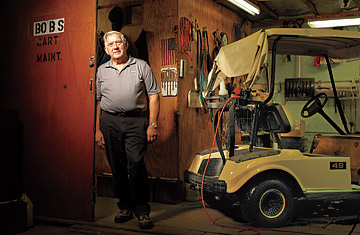
Robert Shively, 68, worked in a chemical plant for 36 years, but that didn't earn him an easy retirement.
(2 of 8)
The Society of Professional Asset-Managers and Record Keepers says nearly 73 million Americans, or just under 50% of our working population, now have a 401(k). And collectively we pour more than $200 billion into these accounts each year. But retire rich? Don't bet on it. The average 401(k) has a balance of $45,519. That's not retirement. That's two years of college. Even worse, 46% of all 401(k) accounts have less than $10,000. Today, just 21% of all U.S. workers are covered by traditional pensions, and the number shrinks every year. "The time may have come to consider returning 401(k) plans to their original position as a third tier of retirement planning, behind pensions and Social Security," says Alicia Munnell, who heads the Center for Retirement Research at Boston College. "They should not be the thing we rely on for retirement security." And the government seems to agree. This summer, the Government Accountability Office concluded, "If no action is taken, a considerable number of Americans face the prospect of a reduced standard of living in retirement." That's what is known as an understatement.
The 401(k)'s defenders say bad markets don't make the accounts a bad idea--and that it's still too soon to tell whether they work. Many companies adopted them less than 20 years ago. Even then, most firms (including mine) still provided pension plans to their workers. So boomers retiring now were never focused on piling money into 401(k)s. In order for the plans to succeed, workers have to stash savings regularly for about 30 years. Most accounts haven't been around that long.
One exception is Occidental Petroleum. In 1983 the energy and chemicals giant, then No. 14 on the FORTUNE 500, became the first large company to toss its pension and switch to a defined-contribution 401(k)-type system. That was at least a decade before most other large companies made a similar switch, which makes the experience of Oxy Pete and its employees an ideal window on the 401(k).
We talked to nearly two dozen former Occidental employees. All of them are alumni of the company's chemicals division and worked in a Niagara Falls plant. Not all are 401(k) disaster stories, and most had good things to say about Oxy Pete. Some said they were very happy with their 401(k). Jim Maul, 70, has two cars and a boat and travels regularly.
But all the people who shared their financials with us would have been better off in a pension. And nearly all of them, save possibly Maul, do not have the resources they need to live another 20 years in financial comfort. "It's the biggest scam ever put over on the American people," says Dennis O'Neil, a former human-resources executive who worked for Occidental for 29 years.
